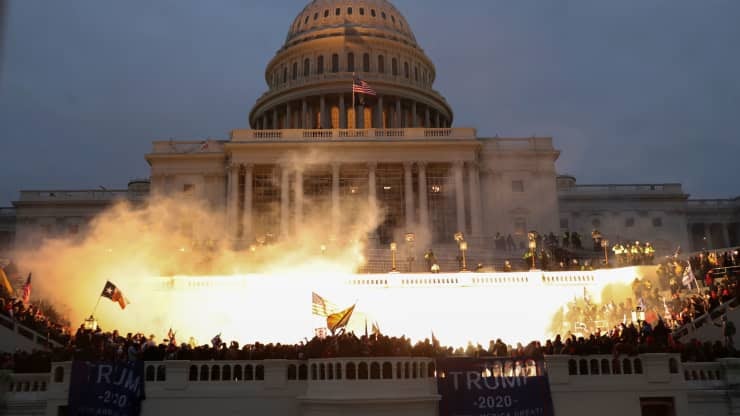‘Can Trump’s impeachment settle the damage done to American democracy?’
An explosion caused by a police munition is seen while supporters of U.S. President Donald Trump gather in front of the U.S. Capitol Building in Washington, U.S., January 6, 2021
Does an inflammatory speech to a gathering of spitting insurrectionists count as evidence of seditious conspiracy? Former president Trump should undoubtedly be held accountable for the death of five people caused by his being a sore loser, but the approaching impeachment trial does not forecast the conviction to do so.
As soon as the day of the riot, Democrats in Congress began advocating for Trump’s removal from office, either via the 25th Amendment or by impeachment. After former Vice President Pence refused to remove Trump from office himself, Congress voted to impeach on Wednesday, Jan. 13. Since then, Mitch McConnell and other Republican senators have pushed to delay the start of the trial, originally scheduled for Feb. 8, until mid-February, in an effort to give Trump’s legal team more time to prepare.
This trial is expected to be much quicker than Donald Trump’s first acquittal back in 2020. Although more brief, it will likely not be more successful than his first trial, despite the number of GOP members who have voiced leniency to supporting conviction. Even Joe Biden remarked that the likelihood of 17 Republicans voting to convict is unlikely, saying in an interview with CNN that Senate bipartisanship “hasn’t changed that much” since he’d held a seat. Most Republicans seem unable to vote in favor of impeachment, which, for a number of them, is surely because it would be an admission of guilt.
In this instance, blame is not so easy to pin down. Republican lawmakers have been preaching alongside Trump throughout 2020, reinforcing into their voter base’s distrust of the election and fear of the American democratic process. Democracy doesn’t work unless voters believe in it, and Trump’s campaign rhetoric consistently undermined millions’ faith in their own voice. Instead, citizens cast their ballots, already believing themselves to be victims more so than voters.
This cycle of distrust in politicians other than Trump was enough to convince his supporters that Republicans who don’t regurgitate the former president’s mask-off approach to pushing his agenda are spineless. Several senators played into that idea’s popularity, discrediting Joe Biden’s electoral college win, and in turn being praised as a truth teller by Trump-loyalists. A cohort of lawmakers contributed to this depraved rhetoric, which gradually culminated into a story compelling enough to provoke domestic terrorism.
Thus, there is a sort of paradox in asking this group of senators who egged on the same demandless mob as Trump to vote and say that the former president should be convicted for those offenses. So to avoid confessing that their various contributions to this inflammatory misinformation is wrong, these sympathizers may simply vote to acquit. This both denies personal accountability and keeps Trump’s supporters voting red, a fix to the question of where his voters’ loyalty will go now that Trump is out of office.
As their defense, Republican lawmakers are falling back on the claim that the “Senate lacks constitutional authority to conduct impeachment proceeds,” according to a statement by Tom Cotton of Arkansas. Cotton also says that the power of impeachment is misused, not intended to be “an inquest against private citizens.” However, if criminal prosecution were a viable option, it would undoubtedly be a more suitable course of action to undergo.
It may be a shockingly satisfactory end to Trump’s smug, unthwartable persona for him to be tried and charged as a “private citizen,” in accordance with the “inquest” Cotton suggested. Furthermore, if Trump were to be criminally prosecuted, it may be just the chance for Congress and the fresh Biden administration to focus instead on their new chapter for America, a sentiment brought up in their calls for unity and reform. However, the FBI and Justice Department seem to be focusing heavily on coverage of their efforts to arrest participants and conspirators in the riots, rather than the instigators themselves. This may suggest that there’s either not enough support for these arrests to be made, or not enough evidence to support various charges.
If Trump were to be charged for the violence his words were instrumental in starting, it would be even more remarkable than if he were convicted in the impeachment trial. It could be the most decisive end to the cult of Trump’s presence—addressing the violence Trump created as the aftermath of a criminal, and duly prosecuting that offender.











